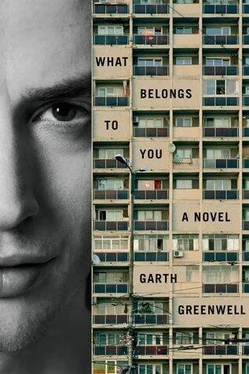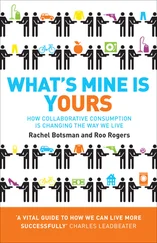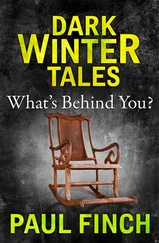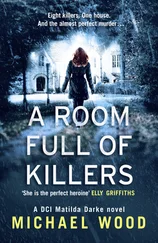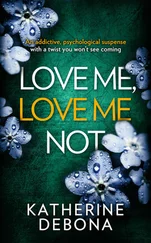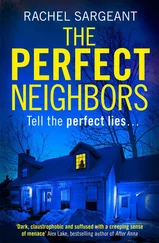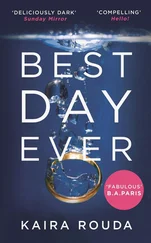I turned off the lights, wanting to be in darkness or near darkness, it’s never truly dark in Mladost, it’s only ever twilight with the lights from the street and from the windows of neighboring buildings; and then I crossed back through the main room and stepped out onto the balcony. It was a crisp night, with a spring chill so different from fall or winter, not in its temperature but in the quality of the air, its softness or tenderness, what has always seemed to me like its welcome. It was late but not terribly late, the moon was in the middle of the sky, the only natural light where it hung above the blokove . I could hear the traffic on Malinov, and there were two cars coming down my own street, one of which pulled into a gap at the curb to park, drawing itself up on the sidewalk and letting its lights go dark. I heard the closing of the building’s door down below, the loud sound it made when pushed open and allowed to swing back freely, a discourteous sound, and then Mitko came into view, walking not quickly but with purpose, not steadily but without risk of tumbling over. He was shaking the cup of yogurt, holding it close to his ear as if fascinated by the sound it made. Ahead of him, the car doors opened, and a young couple stepped out, fashionably dressed, returning from dinner, I supposed. The woman closed her own door and then opened the one behind, bending down to occupy herself with a child, extracting it from its buckles and straps and then rising up again with it in her arms. It was a little girl, I thought, judging from her clothes rather than from any features I could make out, and she was sleeping, her body was limp in her mother’s arms. Mitko slowed his pace as he approached them, looking at the little girl with interest, the yogurt still raised to his ear though he had stopped shaking it, and I saw him lean toward the child a little, saying something, though of course I couldn’t make out the words. I had witnessed this many times here, the freedom with which people addressed small children, leaning in as Mitko did now, calling them milichka , sweetness, as I imagined him doing; no one took offense, as though it were granted that children were a kind of public property, something to be cherished in common. There was a crisis, every few months there were alarming articles in the newspapers about the falling birthrate; though there were many children in my neighborhood the country as a whole was imperiled, people couldn’t afford children, or they saw no point in having them, and as everyone who has the chance flees abroad — like my own students, I thought, who are so eager to escape — the population declines and the warnings in the papers grow more strident and the nation itself becomes a little less real, fading away, some fear, to nothing. There’s no hope for it, some of my students have said, not in class but in private, whispering as though it shouldn’t be said out loud, it is a dying country. Small children are a shared joy, then, their parents bask in it, the stroked cheeks and milichka s, but this mother didn’t welcome Mitko’s joy at the sight of the child; she turned from him just slightly, not rudely but insistently, as if shielding the girl from his interest, and then the father was beside them, ushering them toward their building’s door. Mitko stood for a moment, as if perplexed, and again I was filled with grief for him, seeing him standing alone on the street. He had always been alone, I thought, gazing at a world in which he had never found a place and that was now almost perfectly indifferent to him; he was incapable even of disturbing it, of making a sound it could be bothered to hear. Suddenly I was enraged for him, I felt the anger I was sure he must feel, that futile anger like a dry grinding of gears. But from a distance Mitko didn’t seem to feel anything at all; these were only my own thoughts, I knew, they brought me no nearer him, this man I had in some sense loved and who had never in the years I had known him been anything but alien to me. He set off again, shaking the cup of yogurt he had never lowered from his ear, and I watched him until he turned out of sight, headed toward the boulevard and the bus that would carry him away. I stood there for some time, gazing at the corner from which he had vanished. Then I stepped inside, and sitting where he had been just a moment before beside me, I lowered my face into my hands.
An earlier version of the first section of this novel was published as a novella in 2011. Thank you to Keith Tuma, Dana Leonard, and everyone at Miami University Press. Special thanks to David Schloss.
* * *
Anna Stein created a place in the world for this book by the sheer force of her belief in it. Thank you also to Alex Hoyt, Sally Riley, and Nishta Hurry. I’m grateful to Mitzi Angel for her heroic editing, and to everyone at Farrar, Straus and Giroux for being so welcoming of this novel and its author. Thank you especially to Will Wolfslau for his invaluable help.
* * *
It has been a privilege to spend the last two years at the Iowa Writers’ Workshop. Thank you to Connie Brothers, Deb West, Jan Zenisek, and Kelly Smith. I’m grateful to Lan Samantha Chang for her generous and brilliant teaching, and to the members of her Fall 2013 novel workshop, especially Micah Stack, Novuyo Rosa Tshuma, and D. Wystan Owen. Work on this book was supported by an Iowa Arts Fellowship and a Richard E. Guthrie Memorial Fellowship; many thanks to the University of Iowa and the Guthrie family for their generosity.
* * *
For advice and encouragement, thank you to Elizabeth Frank, Kyle Minor, Peter Cameron, Elizabeth Kostova, Honor Moore, Paul Whitlatch, Margot Livesey, Robert Boyers, and Stephen McCauley. For the inspiration of their teaching and example, thank you to Frank Bidart, Kevin Brockmeier, Carolyn Forché, Carl Phillips, Jorie Graham, and James Longenbach. For pointing me toward a title, thank you to Meredith Kaffel. For checking my Bulgarian, thank you to Maria Manahova and Boian Popunkiov.
* * *
For reading first and final drafts, thank you to Mary Rakow, Ilya Kaminsky, and Ricardo Moutinho Ferreira.
* * *
It is impossible to imagine my life without Alan Pierson and Max Freeman, my chosen family. Finally, thank you to Luis Muñoz, por una canción largamente esperada .

Garth Greenwell is the author of Mitko , which won the 2010 Miami University Press Novella Prize and was a finalist for the Edmund White Debut Fiction Award and a Lambda Award. A native of Louisville, Kentucky, he holds graduate degrees from Harvard University and the Iowa Writers’ Workshop, where he was an Arts Fellow. His short fiction has appeared in The Paris Review and A Public Space. What Belongs to You is his first novel. You can sign up for email updates here.

